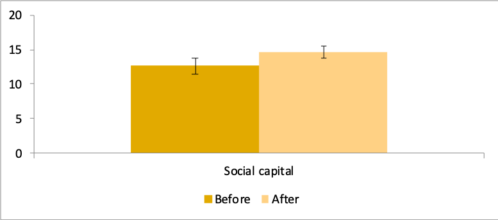Employment opportunities through social and peer networks.
Helping NEETs to increase their social capital – we report on findings from a European study in Italy, Spain and Portugal.
Being not in education, employment or training (NEET) can be bad for your health and wellbeing. Studies have found that being NEET is associated with numerous negative consequences, both at an individual level but also at a societal level. At the individual level, young people who are NEET are more likely to have mental health issues, be socially excluded and exposed to discrimination and poverty. At a societal level, it results in additional costs for health and welfare payments and unused manpower.
Even before the current Covid-19 crisis, large numbers of young people aged 20-34 were NEET – around 16.5% across Europe in 2018. The proportion was even higher in some countries; in Italy, for example, it was as much as 28.9%. The ongoing pandemic is likely to have exacerbated the situation. Recent statistics have, for example, shown that many young people have simply stopped looking for work.
Many projects have tried to address this issue by helping young people to learn new skills or improve their employability skills. However, such strategies adopt a ‘deficit model’ – assuming that the problem lies with young people rather than the wider social and institutional context.
The ongoing European project ComNetNEET – CNN has tried to adopt a different approach, by focussing on developing young people’s social capital. Social capital is, in this sense, understood as social and peer networks, that can be used to find employment opportunities. A recent study in the UK, for example, found that:
‘Young people’s social capital in the form of family, friends and other networks was exceptionally important in helping them out of their inactivity and into EET’.
The CNN model, therefore, does not only focus on helping young people to improve their employability skills, via a mixture of individual and group-based coaching sessions tailored to their interests and needs but also aims at engaging local key stakeholders and community leaders to provide a more supportive network.
Key to the model is also providing participants with firsthand experiences of the world of work to give them a better understanding of routes into employment and links with potential employers.
Evaluation evidence collected as part of three pilots in Italy, Spain and Portugal conducted over the last year show promising evidence that this approach can really help young people.

Note. N=28; figure shows average scale scores with 95% confidence intervals.
The figure shows that the programme enabled participants to increase their social capital on average – this was measured using a 4-item scale at the start and end of the programme (p<.005). There was also qualitative evidence that the support received, and work-related activities helped improve their confidence and self-esteem and to increase their understanding of routes into employment:
“It allowed me, through job shadowing, to learn more about a work area of my interest. In addition, the program allowed me to discuss how I was searching for jobs and become more aware of what I was doing well and what I could improve”
Finally, 40 of the 53 participants across the three countries were no longer NEET at the end of the programme – the ultimate measure of success.
The pilots also revealed some key challenges of implementing this model – in some countries, it was hard to find employers willing to provide work experience opportunities given high levels of youth unemployment and employment regulations. The Covid-19 pandemic is also likely to mean that some of those who had moved into employment on completion of the programme may not have been able to sustain this positive outcome.
Find out more on the Neets in Action website and on our project page.
To receive news about our projects and/or our 3-monthly Newsletter, join our mailing list – you can tailor what information you receive. View the Professional Development prospectus.